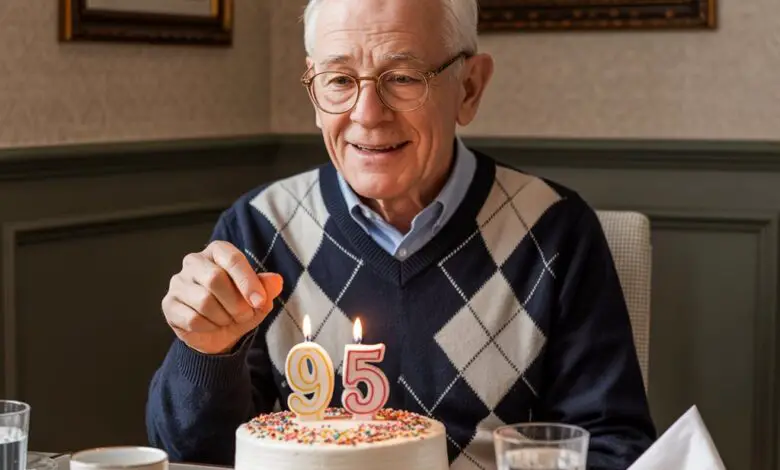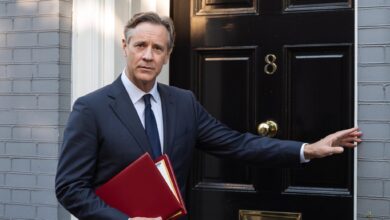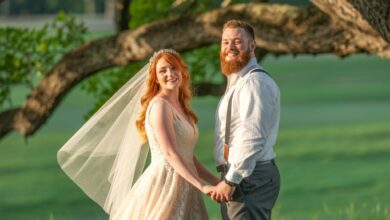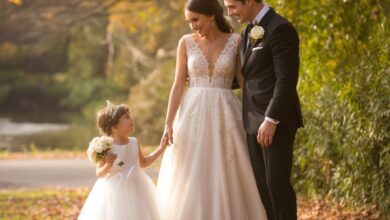HE RAISED HIS HAND AT 95, AND EVERYTHING FROZE

We hadn’t had that many people in one room in years. For Granddad’s 95th birthday, the house overflowed with family, friends, and neighbors—laughing, hugging, swapping old stories. Someone perched a crooked party hat over his hearing aids, and he wore it with pride, smiling from his oversized armchair in that same old brown cardigan.
He looked smaller than I remembered, his body a little more fragile. But his eyes? Sharp as ever—maybe even sharper than they were five years ago.
We launched into a loud, off-key rendition of “Happy Birthday,” phones raised to capture the moment. The cake was a towering masterpiece, its candles glowing like a tiny constellation. Just as he leaned forward to blow them out, Granddad paused.
He slowly raised his hand—not to wave, not to joke, but to speak.
The room fell silent.
“I need to say something,” he said, his voice quiet but clear. “Before I blow out these candles… there’s something I should’ve said a long time ago.”
All at once, the energy in the room shifted. My mom lowered her phone. My uncle leaned in. Even the kids froze.

“It’s about what happened in 1978,” Granddad continued. “At the lake.”
The words hit like a ripple across the crowd. A soft gasp. A sudden stillness. I remembered hearing vague mentions of that summer growing up—whispers about a storm, a boat, something unspoken. My mom always brushed it off.
But Granddad wasn’t brushing anything off now.
“I want to apologize,” he said. “Not just for what I did, but for keeping it from you all. I never meant to hurt anyone. But things… got complicated.”
His gaze landed on Uncle Ben, whose knuckles had gone white around his soda can.
“That summer,” Granddad went on, “we were about to lose the cabin. Your grandmother and I kept it to ourselves—we didn’t want to worry anyone. But when I realized we couldn’t make the next payment, I panicked. That cabin meant everything to me.”
He paused, then added, “I took a crowbar down to the dock and pulled out a stash of old letters I’d hidden years earlier. Letters that proved the cabin wasn’t mine—not originally. It was meant for someone else in the family.”
The room stirred.
“But that wasn’t the real secret,” he said. “It’s what happened next.”
Mom’s voice barely rose above a whisper. “The accident?”
Granddad nodded. “There was a storm coming, and I went out on the lake, hoping to salvage a few things. The boat was in bad shape. The sky turned fast. That’s when I saw Ben—seventeen and stubborn—waiting on the dock. I told him to stay put. But he jumped in anyway.”
Uncle Ben gave a slow nod. “I remember. You yelled, but I didn’t listen.”
“You tried to help me tie the boat,” Granddad said. “But the dock was slick. You slipped, hit your head. I thought I lost you.”
His voice cracked for the first time.
“I pulled you into the boat and paddled through that storm as fast as I could. I lost the crowbar. Lost the letters. But I got you back. I wrapped you in towels by the fire and prayed you’d wake up.”
Uncle Ben reached up and touched the faint scar near his temple. “I remember waking up. You were pacing. You never said a word.”
“I couldn’t,” Granddad said. “I was ashamed. I almost lost you over a piece of property. I didn’t know how to explain it.”
He let the silence settle before finishing. “I sold the farmland. Kept the cabin. And I buried the rest.”
No scandal. No betrayal. Just a moment of fear, of love, of desperation. And a silence that stretched across decades.
“I couldn’t carry it any longer,” he said. “This family means everything to me. And when we face storms—real or otherwise—we have to face them together.”
Uncle Ben stood and walked over. He knelt beside Granddad, took his hand.
“I blamed you for a long time,” he said. “But I didn’t know the whole story.”
“I wish I’d told you sooner,” Granddad whispered.
My mom came forward, eyes wet. “We’re just glad you finally did.”
From the back of the room, Miss Francine, our longtime neighbor, chimed in softly, “I remember that storm. I always wondered. Thank you for telling us.”
Even my youngest cousin leaned over and whispered, “Now I get it. I always wondered what made that summer different.”
Granddad chuckled. “Well, that’s my confession. Can I blow out these candles now before the frosting melts?”
Laughter broke through. We raised our phones again—this time not just to capture a birthday wish, but a moment of healing.
With one deep breath, Granddad blew out every candle.
Applause filled the room. Hugs followed. Some tears. Aunt June even passed around a Polaroid from 1978—Granddad, Uncle Ben, and Mom smiling on the cabin porch, the boat just barely visible in the background.
Later, as the party wound down and the last slice of cake disappeared, I sat next to Granddad. His party hat was still hanging on, barely.
“Thanks for staying,” he said.
“You only turn 95 once,” I smiled. “Might as well make it memorable.”
He grinned. “Family’s messy. But truth brings us back together. Remember that.”
“I will.”
The next morning, I found a folded note left on the kitchen table. The ink had faded with time. It read: “Love anchors us more than fear ever could.”
That was the heart of his confession. Not a dramatic twist or a shocking reveal—but a reminder that honesty, even when it’s difficult, has the power to bring us closer. At 95, Granddad didn’t just blow out candles—he gave us all a second chance to understand, to forgive, and to reconnect.
And that, more than anything, was the real gift.





